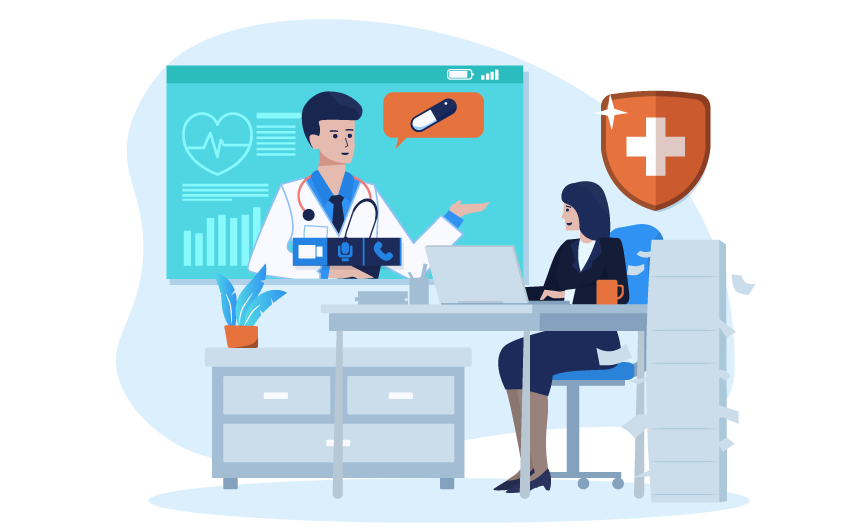Telemedicine is the best tool for doctors and patients. Apart from providing huge benefits to healthcare providers, it also has challenges that organizations should consider while providing medical care to patients.
Protecting the data of the patients is important for any healthcare provider. So, organizations should take the necessary steps to ensure patient data is secure and free from security breaches and violations.
Partner with a custom healthcare software development company that will help you to ensure the high-level security of patient data and records.
In this blog, we will understand how telemedicine security safeguards patient data and helps hospitals ease medical procedures without leaking the data to threats and breaches.
How to ensure patient data security
Below, we highlighted a few steps that help hospitals ensure data security and solve telemedicine cybersecurity concerns:
Providing a secure communication medium
The healthcare industry should use secure and convenient tools to connect with healthcare specialists. Furthermore, healthcare providers should use tools that adhere to HIPPA compliance.
By using video conferencing and other messaging tools, data gets encrypted. Hospitals and clinics should use popular tools such as Zoom, and Doxy. me to communicate with their patients.
Also, these tools ensure data security. The importance of data security in healthcare organizations protects both doctors and patients and helps them to interact smoothly with others.
Use authentication and access control methods.
Healthcare organizations should use strong security and access management approaches to protect patient data from breaches and hackers. These encryption techniques allow only an authentic person to view the data.
Furthermore, companies should combine high-security check features to protect confidential data. Telemedicine software should allow only reliable users to view and use.
Encryption
Hospitals should protect all the patient’s medical records and information, such as diagnosis reports, bills, and documents.
Furthermore, Encryption techniques ensure that even if unreliable users view the data, it is impossible to hack the data without using passwords.
Regular Software Updates
Healthcare organizations should keep all the telemedicine software updated with the latest security rules and regulations. Furthermore, outdated software is more prone to security attacks.
By updating the software, healthcare organizations can protect the patient confidential data efficiently. Thus, it reduces the risks of the telehealth industry. Get help from a hospital management software development company to update all your software and protect your healthcare system.
Training and Education
Doctors should take proper training and education on protecting the data security of the patient.
It will help them to easily manage the patient’s record and protect the data from hackers.
It includes a complete understanding of data security methods, understanding phishing, and HIPAA rules and guidelines.
Data Backup and Recovery
Hospitals should take the backup of all the medical data regularly. Furthermore, data backup protects the organization from accidental loss of data due to security violations, threats, or other system failure-related problems.
Updating and checking the medical data and information will help you to recover the data easily and conduct the medical process smoothly.
Use Strong Password Approaches
Telemedicine software should follow strong password approaches. There should be unique and strong passwords for all the users.
Telemedicine app development solutions should provide strong security access and educate people to create strong passwords and update them regularly. By following these measures, organizations can save medical data and records from unauthorized access.
Telemedicine Rules
The telemedicine industry needs to explain all the rules and policies of telemedicine software. Patients should know about how to protect patient privacy and security approaches to help them protect all their information.
All the data of the patient should be password protected, and the patient should not reveal their password to anyone. Furthermore, patients should know about the privacy risks of telemedicine.
Secure File Sharing
The Telehealth industry should use encryption or data safety techniques when sharing data patient data.
Furthermore, they should avoid sending confidential or sensitive information about the patient through emails or messages.
All major problems with telehealth can be resolved when providers will keep the data safe.
Regular Security Audits
Telemedicine should conduct audits to know the vulnerabilities and weaknesses in the hospitals or clinics. Furthermore, telemedicine should resolve the issue of the doctors or patients to ensure smooth services and better user experiences.
Device security
Telemedicine should check the security of all the devices used for consultation. It is important to update the software and use firewalls to protect the data from threats and hackers. It is essential to solve the issues in telemedicine.
Data Retention Policies
Medical industries need to ensure data retention policies and store data for a certain period. Furthermore, telemedicine should dispose of the patient data properly. It will reduce the risks of telehealth data breaches.
Compliance with Regulations
Telehealth industries need to adhere to healthcare regulations such as the Health Insurance Portability and Accountability Act (HIPAA) and be informed of their data security needs.
Failure to fulfill their security requirements may result in telemedicine legal and ethical issues.
Incident Response Plan
Telemedicine should create an incident response plan to protect the patient data from security and breaches. It should include necessary steps to identify the parties and steps to solve telemedicine problems.
Patient Education
Telemedicine companies should educate patients on using the software and how to protect the data from hackers.
Furthermore, educate them to use a secure Wi-Fi network, protect their passwords, and report if they notice any spam activity in their data.
Conclusion
Protecting the data of the patients is important for any healthcare provider. So, telehealth organizations should take the essential steps to ensure patient data is secure and free from security breaches and violations.
The telemedicine industry needs to explain all the rules and policies of telemedicine software. Patients should know about how to protect patient privacy and security approaches to help them protect all their information.
